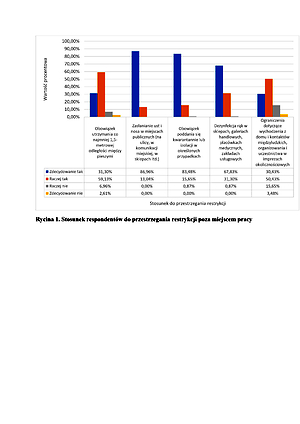Editor's Choice
RESEARCH PAPER
Attitudes of health care workers towards the COVID-19 pandemic
1
Zakład Epidemiologii, Wydział Nauk o Zdrowiu w Bytomiu, Śląski Uniwersytet Medyczny w Katowicach, Polska
Corresponding author
Agata Wypych-Ślusarska
Zakład Epidemiologii, Wydział Nauk o Zdrowiu w Bytomiu, Śląski Uniwersytet Medyczny w Katowicach, ul. Piekarska 18, 41-902, Bytom, Polska
Zakład Epidemiologii, Wydział Nauk o Zdrowiu w Bytomiu, Śląski Uniwersytet Medyczny w Katowicach, ul. Piekarska 18, 41-902, Bytom, Polska
Med Srod. 2022;25(1-2):21-27
KEYWORDS
TOPICS
ABSTRACT
Introduction and objective:
On 10 March, 2020, the World Health Organization (WHO) declared the COVID-19 pandemic, which has become a public health emergency of international concern. The purpose of this study was to explore the attitudes of health professionals towards the COVID-19 outbreak.
Material and methods:
A survey of 115 health care professionals was conducted in late 2020. The research tool was a questionnaire constructed based on surveys by the Public Opinion Research Center (CBOS). When analyzing the relationships, two groups were distinguished: hospital employees and those employed in other units, and employees with and without contact with patients. The results were processed using Microsoft Office Excel and Statistica 13.0. Analyses of the relationships were performed using the chi-square test, p<0.5.
Results:
More than a half of the respondents (51.30%) considered the current pandemic something unprecedented. Outside work, 86.96% of respondents covered their mouths and nose in public places, and 99.13% used hand disinfection in public places. Most employees of medical units (50.43%) considered the restrictions and security measures related to the COVID-19 pandemic to be too restrictive. This was due to the occupation performed and related with it direct contact with patients. Willingness to undergo vaccination against COVID-19 was expressed by 65.22% of respondents.
Conclusions:
Health care professionals have a high level of awareness of the need for SARS-CoV-2 prevention and adhere to epidemic safety measures both at and outside the workplace. Most health care professionals believe that the current pandemic safety measures are too restrictive. Most health care professionals (65.22%) were willing to be vaccinated against COVID-19.
On 10 March, 2020, the World Health Organization (WHO) declared the COVID-19 pandemic, which has become a public health emergency of international concern. The purpose of this study was to explore the attitudes of health professionals towards the COVID-19 outbreak.
Material and methods:
A survey of 115 health care professionals was conducted in late 2020. The research tool was a questionnaire constructed based on surveys by the Public Opinion Research Center (CBOS). When analyzing the relationships, two groups were distinguished: hospital employees and those employed in other units, and employees with and without contact with patients. The results were processed using Microsoft Office Excel and Statistica 13.0. Analyses of the relationships were performed using the chi-square test, p<0.5.
Results:
More than a half of the respondents (51.30%) considered the current pandemic something unprecedented. Outside work, 86.96% of respondents covered their mouths and nose in public places, and 99.13% used hand disinfection in public places. Most employees of medical units (50.43%) considered the restrictions and security measures related to the COVID-19 pandemic to be too restrictive. This was due to the occupation performed and related with it direct contact with patients. Willingness to undergo vaccination against COVID-19 was expressed by 65.22% of respondents.
Conclusions:
Health care professionals have a high level of awareness of the need for SARS-CoV-2 prevention and adhere to epidemic safety measures both at and outside the workplace. Most health care professionals believe that the current pandemic safety measures are too restrictive. Most health care professionals (65.22%) were willing to be vaccinated against COVID-19.
REFERENCES (23)
3.
Tyrrell DA, Bynoe ML. Cultivation of a novel type of common-cold virus in organ cultures. BMJ. 1965; 1:1467–1470. doi: 10.1136/bmj.1.5448.1467.
4.
Cheng VC, Chan JF, To KK, Yuen KY. Clinical management and infection control of SARS: lessons learned. Antiviral Res. 2013; 100: 407–419. doi:10.1016/j.antiviral.2013.08.016.
5.
Singh SK. Middle East Respiratory Syndrome Virus Pathogenesis. Semin Respir Crit Care Med. 2016; 37(4):572–7. doi: 10.1055/s-0036–1584796.
6.
Wu D, Wu T, Liu Q. The SARS-CoV-2 outbreak: What we know. Int. J. Infect. Dis. 2020; 94:44–48. doi: 10.1016/j.ijid.2020.03.004.
7.
Centrum Badania Opinii Społecznej. Komunikat z badania. Obawy przed zarażeniem koronawirusem i ocena działań rządu. 11.2020. URL: https://www.cbos.pl/SPISKOM.PO... (access: 22.12.2021).
8.
Chmielewski PJ, Raczek M, Puścion M, Chmielowiec B, Pawlas N, Łuszczki JJ. COVID-19, wywołany przez wirus SARS-CoV-2, jako choroba zawodowa osób wykonujących zawody medyczne. Med Og Nauk Zdr. 2021; 27(3): 235–243. doi: 10.26444/monz/139319.
9.
Naczelna Izba Lekarska w Warszawie. Zestawienie liczbowe lekarzy i lekarzy dentystów wg wieku, płci i tytułu zawodowego z uwzględnieniem podziału na lekarzy wykonujących i nie wykonujących zawodu. URL: https://nil.org.pl/uploaded_fi... -zestawienie-nr-03.pdf (access: 23.05.2022).
10.
Asemahagn MA/ Factors determining the knowledge and prevention practice of healthcare workers towards COVID-19 in Amhara region, Ethiopia: a cross-sectional survey. Trop Med Health. 2020; 48:72. doi: 10.1186/s41182-020-00254-3.
11.
Zhou M, Tang F, Wang Y, et al. Knowledge, attitude and practice regarding COVID-19 among health care workers in Henan, China. J Hosp Infect. 2020; 105(2):183–187. doi: 10.1016/j.jhin.2020.04.012.
12.
Saqlain M, Munir MM, Rehman SU, et al. Knowledge, attitude, practice and perceived barriers among healthcare workers regarding COVID-19: a cross-sectional survey from Pakistan. J Hosp Infect. 2020;105 105(3):419–423. doi: 10.1016/j.jhin.2020.05.007.
13.
Centrum Badawczo-Rozwojowe Biostat. Komunikat z badania. Mity o koronawirusie. Polacy o skuteczności ochrony przed SARS-CoV-2. 09.2020. URL:https://www.biostat.com.pl/new... (access: 22.12.2021).
14.
Centrum Badania Opinii Społecznej. Komunikat z badania. Jak się chroniliśmy- zachowania Polaków w pierwszych dniach epidemii. 03.2020. URL: https://www.cbos.pl/SPISKOM.PO... (access: 22.12.2021).
15.
Danielak M, Dziemidok P. Koronawirus – SARS-CoV-2 – zapobieganie zakażeniom – doświadczenia własne. Med Og Nauk Zdr. 2021; 27(1): 7–12. doi: 10.26444/monz/132556.
16.
Romer D, Jamieson KH. Patterns of media use, strength of belief in COVID-19 conspiracy theories, and the prevention of COVID-19 from March to July 2020 in the United States: Survey Study. J Med Internet Res. 2021; 23(4):e25215. doi: 10.2196/25215.
17.
Oleksy T, Wnuk A, Gambin M, Łyś A. A dynamic relationship between different types of conspiracy theories about COVID-19 and protective behaviour: a four-wave panel study. Soc Sci Med. 2021; 280:114028. doi: 10.1016/j.socscimed.
18.
Raczkiewicz P, Trojnar M, Zaremba B, Śmiech N. COVID 19. Med Og Nauk Zdr. 2021; 27(4): 333–337. doi: 10.26444/monz/143362.
19.
Wróblewska I, Wróblewska Z, Grudzień R, Dziechciarz M, Czabak-Garbacz R, Choina P, Chmielewski J. Niepożądane odczyny poszcze-pienne występujące u pacjentów szczepionych przeciwko SARS-CoV-2. Med Og Nauk Zdr. 2021; 27(4): 421–427. doi: 10.26444/monz/145063.
20.
Centrum Badania Opinii Społecznej. Komunikat z badania. Stosunek do szczepień przeciw COVID-19 i grypie. 12.2020. URL: https://www.cbos.pl/SPISKOM.PO... (access: 22.12.2021).
21.
Centrum Badania Opinii Społecznej. Komunikat z badania. Stosunek do szczepień przeciw COVID-19 i ocena ich realizacji, 04.2021. URL: https://www.cbos.pl/SPISKOM.PO... (access: 22.12.2021).
22.
Tuszyński P, Uman-Ntuk E, Moskwiak A. Raport z badania. Stosunek farmaceutów i techników farmaceutycznych do szczepień przeciw COVID-19. Instytut Rozwoju Opieki Farmaceutycznej, 01.2021. URL: file:///C:/Users/Asia/AppData/Local/Temp/Szczepienia-COVID-19-a -farmaceuci-Raport-IROF_v1–1.pdf (access: 22.12.2021).
23.
Wypych-Ślusarska A, Grot M, Nigowski M. Zachowania mające na celu wzmocnienie odporności w okresie pandemii COVID-19. Med Srod. 2021; 24(1–4): 5–10. doi: 10.26444/ms/142528.
Share
RELATED ARTICLE
We process personal data collected when visiting the website. The function of obtaining information about users and their behavior is carried out by voluntarily entered information in forms and saving cookies in end devices. Data, including cookies, are used to provide services, improve the user experience and to analyze the traffic in accordance with the Privacy policy. Data are also collected and processed by Google Analytics tool (more).
You can change cookies settings in your browser. Restricted use of cookies in the browser configuration may affect some functionalities of the website.
You can change cookies settings in your browser. Restricted use of cookies in the browser configuration may affect some functionalities of the website.



